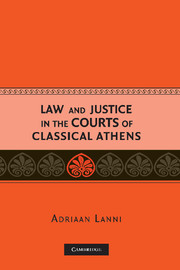3 - Relevance in the Popular Courts
Published online by Cambridge University Press: 18 July 2009
Summary
the modern reader of a speech intended for delivery in the athenian popular courts is immediately struck by a bizarre amalgam of the familiar and the foreign. Alongside a narrative of the events in question, bolstered by witness testimony and the discussion and citation of laws, one finds a variety of material that would be considered irrelevant or inadmissible in a modern courtroom. Launching personal attacks unrelated to the charges in the case, for example alleging that one's opponent is sexually profligate, or that he is descended from slaves, was commonplace. The character and reputation not only of the litigants but of their ancestors and family members were regular topics of discussion. Defendants shamelessly appealed to the jurors for pity, going so far as to bring their weeping children up to the dais as they spoke.
The presence of extra-legal information and argumentation in the popular courts is an important clue to understanding the nature of Athenian legal process. Did the Athenian courts serve, as some scholars have argued, primarily as a forum for litigants to publicly contest their relative honor and prestige before the jury? On this view, it is the seemingly irrelevant arguments that were most important to litigants and jurors, whereas the law under which the suit was brought mattered little. Or are extra-legal arguments simply stray comments to be chalked up to the amateurism and informality of the Athenian system, the attempts of individual litigants to divert the jury from its task of applying the law?
- Type
- Chapter
- Information
- Law and Justice in the Courts of Classical Athens , pp. 41 - 74Publisher: Cambridge University PressPrint publication year: 2006

